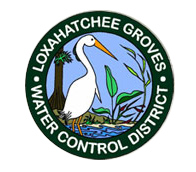The Loxahatchee Groves Water Control District Board of Supervisors approved a resolution Monday that will require lobbyists to register before conducting business with the district.
The idea was introduced by Supervisor Don Widing several months ago, and a draft of the resolution was discussed at the previous board meeting as a way for the district to maintain a reputation of integrity.
“The intent is to promote transparency in the governance of the district,” Widing said. “It serves several purposes. It would require anyone who is a registered lobbyist to provide a lobbyist declaration by signing in with the district, and that becomes a matter of public record.”
Widing said it will protect both supervisors and staff so they do not have to be concerned about anyone having undue sway who comes in to conduct business with the district.
Supervisor John Ryan said a definition of “lobbyist” that was added to the resolution cleared up previous concerns about encompassing too many people and entities that might have made it difficult for some people, including residents, who need to conduct business with the district.
“Lobbyist” under the resolution means a person who is employed and receives payment, or who contracts for economic consideration, for the purpose of lobbying, or a person who is principally employed in governmental affairs by another person or governmental entity to lobby for them.
Prior to engaging in lobbying with the town, that person will be required to sign and file a registration form with the district secretary, including his or her name, address, phone number and e-mail. The lobbyist must also include the name, address and phone number of the person or entity he or she represents, if that is known at the time, as well as general and specific lobbying matters.
No fee will be charged by the district for lobbyist registration.
Supervisor Frank Schiola said he recently learned through the Palm Beach County League of Cities that Palm Beach County has a registry for lobbyists that is available to all municipalities and updated monthly.
“Wouldn’t it be better to get with the county?” he asked. “That way we could be e-mailed throughout the year if somebody comes in.”
Widing said that was good to be aware of, but he would like the district to have a registry of its own.
“We don’t have any policy, so we wouldn’t be obligated to follow any county policy,” he said. “I’m really hesitant to ride only on that concept because that could change any time and it could be outdated. I think it’s a good idea to do both.”
Widing said the district would be more secure by having its own policies.
“It’s nothing more than when they come here, they disclose and put their name in the log — who they are and who they represent,” he said. “That way, nothing is left to chance. We don’t have to worry about lag time or staff having to check with the county.”
Widing said he had no objection to getting the information from the county, which had followed a recommendation by the Office of the Inspector General to establish a lobbyist registry.
“Since we don’t have the inspector general process, special districts are in a bit of a unique situation,” he said. “To me, it’s to protect the interests of the district and just add another layer of security and transparency.”
Ryan agreed with the district having its own registry but thought that having the county’s list in hand would be good for reference purposes in case a lobbyist comes to a meeting and does not identify as such.
“The policy as stated is pretty clear now,” he said. “I doubt that we’re going to have many people registering. I think I’ve only known two that are really lobbyists out in this area.”
Widing said that the registry would probably be more meaningful in the future as more and more developers apply for project approval. However, that might be more of issue for the town, he noted.
“What the town does or doesn’t do with regard to lobbyists is not my concern,” Widing said. “It’s their business, and I’ll stay out of that. I just want to be sure that we’re careful and smart.”
Schiola asked whether a lobbyist would have to register prior to speaking at a public meeting, and Widing said the registry is more for lobbyists who wish to speak with staff or privately with supervisors, and that the public nature of board meetings would address identification issues.
“A public meeting is out in the open and on the record,” Widing said. “It’s different that somebody hops on a Learjet, flies in and has some last-minute business to discuss with [the district administrator]. They’re in a closed-door meeting, and ‘Who was that?’ Very simple, they come to the window, they sign in. [The administrator] doesn’t have to worry. No one else has to worry. That is the public record.”
Widing made a motion to approve the resolution, which carried 4-0 with Chairman David DeMarois absent.








